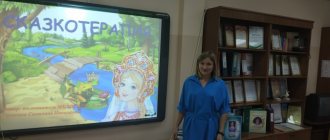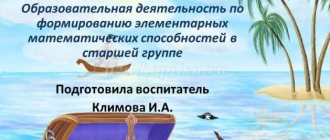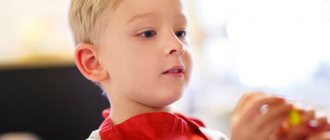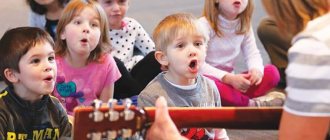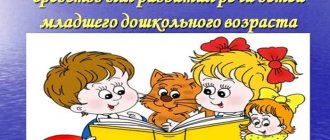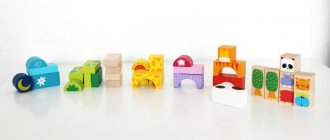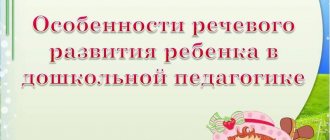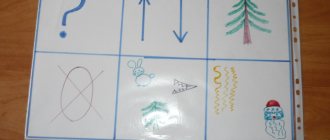NNOD MOVE:
Organizing time
Music sounds, the teacher asks a riddle:
Soft paws There are scratchy paws. Who is this? (Kitty).
The teacher shows a kitten toy; he says the kitten came to visit and wants to play with the children. Children sit down on chairs.
Main part of the lesson
Introduction. Arrival of guests.
Educator:
Which kitten came to visit us? (Small, fluffy, striped). What can a kitten do? (Jump, run, lap milk). What will his name be?
The kitten wants to ask you a riddle:
“Lies under the porch and the tail is like a ring.” (Dog)
A toy dog appears.
Educator:
What kind of dog came to visit us (white, spotted). What can a dog do (bark, growl).
Composing a plot story
Educator:
Guys, we have another guest today - the doll Tanya. Now we’ll all tell you together about Tanya, the kitten and the dog Zhuchka (accompanied by a show of toys).
She took the kitten in her arms and carried it home. At home I poured milk into a saucer. The kitten was delighted with the milk and meowed joyfully, like this: meow-meow. (Pronounce joyfully, cheerfully). How did he meow? (Children repeat the intonation).
The kitten drank milk. Then the dog Zhuchka came running and started barking loudly at the kitten, “Aw-aw!” How did she bark? (Children repeat).
The kitten got angry and meowed meow-meow. How did you meow? (Children show).
The bug got scared and fell silent. And Tanya said, “Let’s live together and play together. The kitten was delighted and meowed joyfully again. How? (Children show).
And the dog barked cheerfully. How?
And no one was afraid of anyone. They began to be friends. Which of you wants to tell about Tanya, Zhuchka, and the kitten?
The teacher calls the child. He begins to tell the story together, the story is repeated twice with different children.
Physical education minute
Musical accompaniment sounds.
Educator:
Imagine that you are kittens and run out for a walk. The kittens wash themselves, meow joyfully, hide (they hear the mouse), and jump. (Children repeat actions and imitation).
Onomatopoeia game
The teacher asks one child to come out and says in his ear to say “meow-meow” with a characteristic intonation (complaining, joyful, angry). The rest of the children guess.
Word games. Pronunciation of pure talk. The kitten and the dog became friends and one day they went for a walk, but a wasp flew up to them at the edge of the forest.
The teacher shows a picture of a wasp and says:
Individually, each child is given a task (say it loud, say it like a mouse) by passing a kitten toy.
Educator:
Today you and I talked a lot about what we say (words). What words are there? Let's clap the words: Tanya, doll, kitten, house, dog, cat, milk wasp, friendship, children,...
Lesson summary:
Let's remember what we did today? What did you like? Who can praise themselves?
Source
Node progress
I organize the children for the lesson, seat them at tables. I say: Children, on the street and at home you see different kittens. Tell me, what kinds of kittens are there? (small, fluffy)
.
And when they are played with, what are they like? (playful, mischievous, cheerful)
.
Let's talk about one kitten. What is he like? (affectionate, small, what can a kitten do? (jump, lap milk, play)
.
Now I will tell you a story about Masha and the kitten ( the story is accompanied by a show)
.
This is Masha, she comes home from a walk and sees a little kitten lying and meowing pitifully, like this: meow-meow (plaintive intonation)
.
How does a kitten meow? (children repeat intonation)
.
Masha took the kitten in her arms and carried it home. At home I poured milk into a saucer. The kitten was happy about the milk and meowed joyfully, like this: meow-meow (pronounced joyfully, cheerfully)
.
How did he meow? (children repeat intonation)
.
The kitten drank milk and fell fast asleep. Then the dog Bug came running and began barking loudly at the kitten: Af-Af! How did she bark? The kitten got angry and meowed . How did the kitten meow? The Bug got scared and fell silent. And Masha said: “Let’s play together, we must live together
. And the kitten meowed joyfully again. How? And the dog barked cheerfully. How? And no one was afraid of anyone.
Which of you wants to tell about Masha , the kitten and the dog Zhuchka with me? I call three children. I begin to tell the story together with the first child: “This is Masha. She is walking home from a walk. Suddenly she saw a kitten. He meowed pitifully: meow-meow. Masha took the kitten in her arms and carried it home.” Then, with my help, another child says : “Masha poured milk into a saucer, and he began to lap it up. When he got drunk, he meowed joyfully (meow-meow)
and went to bed."
Then the dog Bug came running and barked loudly (af-af)
.
The kitten got angry and meowed angrily (meow-meow)
.
The story continues with the third child. “The Bug got scared and fell silent. And Masha said: “Let’s play together, we must live together.”
.
The kitten meowed joyfully, the dog barked happily. The story is repeated twice , with a new group of children . Children talk on their own , and I provide help if necessary. Then one of the children tells the story in full .
I invite the children to imagine that they are kittens and run out for a walk. Kittens wash themselves with it happily, they meow joyfully. Children perform actions, repeat onomatopoeias with appropriate intonation.
The lesson continues. The children take their seats.
Guess how the kitten meows? (complaining)
.
And now? (angrily)
.
And now? (complainingly)
.
How does a kitten purr? (purr purr)
.
What does a mosquito call? (z-z-z)
.
Well done. Pronounce the sound “z”
loudly and protractedly with one exhalation.
Then I name the words, and the children clap their hands when they hear the sound “z” (bunny, bear, goat, mushroom, umbrella, etc.)
.
I praise the children, well done guys. I draw a conclusion from the lesson about what we did during the lesson. Today we had a good time with you, we talked about the kitten , the dog Zhuchka and the girl Masha. You told and listened attentively. This concludes our lesson, you can get up quietly and go play with toys .
Synopsis of a frontal lesson on the development of coherent speech “Composing a story based on a series of plot paintings “Tangle” Correctional and educational goals. Activation and updating of the dictionary on the topic “Pets”. Formation of a holistic impression about.
Notes on the development of coherent speech in the senior group “Composing descriptive stories based on a set of toys” Compiling descriptive stories about insects (based on a set of toys) Tasks. Coherent speech: teach children to write descriptive stories.
Summary of the educational situation in the Senior group Topic: “Composing a story based on a set of toys” EXPLANATORY NOTE. 1. NGO "SPEECH DEVELOPMENT". 2. OS topic “Making a story based on a set of toys.” (method. lit. - ra O. S. Ushakova). Lesson notes for a senior speech therapy group. Topic: “Migratory birds. Compiling the story “Birdhouse” Lesson notes for a senior speech therapy group. Topic: “Migratory birds. Compiling the story “Birdhouse” based on a series of plot pictures.
Lesson notes for older children. Topic: “Drafting a descriptive story based on mnemonic tables” Program content: Educational objectives: 1. Teach children to establish logical connections in the development of the storyline 2. Summarize the accumulated ones.
Lesson summary using TRIZ “Composing a story based on the painting “Village Yard” MUNICIPAL AUTONOMOUS PRESCHOOL EDUCATIONAL INSTITUTION COMPENSATING KINDERGARTEN No. 3 “RAINBOW” Master class with elements.
Outline of an integrated lesson on speech development “Composing a story on choosing military-themed toys” Topic: Composing a story on choosing military-themed toys. Goal: mastery of speech as a means of culture and communication, enrichment of active.
Outline plan for speech development in the middle group “In a toy store” (drawing up a descriptive story about a toy) Department of Education of the Administration of the Municipal District of the Tuymazinsky District of the Republic of Bashkortostan Municipal budgetary preschool.
Compiling a descriptive story with children of senior preschool age with special needs development. Topic “Vegetables” Topic “Vegetables” Goal: Formation of skills to write a descriptive story on the topic “Vegetables” Educational Objectives: • Consolidation of ideas.
Source
Speech development of preschool children. Compiling a descriptive story about toys in the older group
Maria Kamyshnikova
Speech development of preschool children. Compiling a descriptive story about toys in the older group
Educational field "Communication"
Speech development.
Compiling a descriptive story about toys in the senior group “Journey to the Enchanted Forest”
.
• teach children to write descriptive stories ;
• continue to develop speech creativity and coherent speech of children;
• consolidate children's knowledge about wild animals, practice naming their cubs;
• develop the ability to understand the task at hand;
• cultivate a love for animals.
• continue to teach how to coordinate adjectives with nouns in number and gender;
•enrichment of the dictionary with words: long-eared, short-tailed.
• viewing albums with images of wild animals;
• modeling and drawing forest animals;
trees, bushes (to imitate a forest)
;
chest with toys ;
toys : fox, bear, squirrel, hare, wolf;
